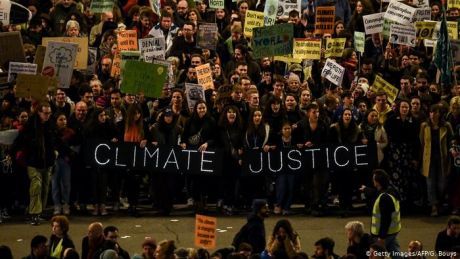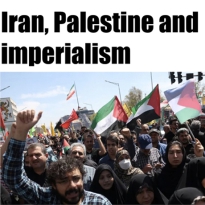News
You are here
COP out in Madrid as Climate Talks Collapse

December 17, 2019
The 25th meeting of the Conference of Parties (COP), the main annual UN climate meetings that gave life to the Kyoto and Paris agreements ended in spectacularly depressing failure. It was a meeting where the market mechanisms built into the 2015 Paris agreement were to be negotiated and agreed upon but this proved unattainable because of the blocking of real action by the world's most developed nations, while protesters took over the the streets of Madrid and even erupted inside the main conference hall.
The refusal of the US to even engage with the international efforts to curb emissions, particularly under President Bush and Trump, has seriously hampered even the baby steps to action that these agreements represent.
During these latest meetings, a number of nations pushed for more action; some, including small pacific islands in danger of disappearing under the waves along with some developed nations urged adopting more stringent emissions targets based on new scientific reports that show that the climate crisis is deepening. Others, like China, India and many others oppose this, arguing that the most developed nations have to act on their previous commitments under the Kyoto and Paris agreements before working on new standards. They pushed for a provision that would create a work program to assess the attainment of previous targets. As the Indian representative said: "The problems we are facing today are not because of lack of intent but because of lack of implementation which is very glaringly visible in the unmet pre-2020 targets. The work programme was meant to address these gaps,".
The provision was dropped, as the US representative refused to even allow a mention of target assessments. Despite many shortcomings, the Kyoto Protocol had the virtue of having deeper targets for developed nations, recognizing the greater effect of past emissions on current warming. This is why the US pushed so hard to avoid adopting Kyoto, because it called for them to act first.
And the negotiations on carbon markets bogged down between developed and developing nations so that a draft agreement on these provisions was not even tabled. These carbon market provisions, where instead of actually lower emissions, carbon credits or offsets can be purchased that supposedly sink carbon by tree planting or other programs, are the poison pill of these agreements from the beginning. Now it seems, developing countries are seeking more return on these "indulgences" for bad fossil practices, more than the developed countries are willing to spend.
All these conflicts show deep divides between the nations of the world, and the dominance of the most developed nations, like the US, on the outcome of these meetings. There are divisions and competition between those nations at the top of the hierarchy of military and economic domination and the poorer, weaker nations that are relegated to their place in the world system. There are also divisions and competition between developed nations, as each tries to jockey for a better position in the world order.
The UN climate meetings have no mechanism to counteract these realities of imperialism and division, because these international organizations simply replicate the divisions that exist; there is no impartial arbiter capable of mediating between them.
The fact that poorer and less developed nations pushed for more drastic action is a testament to the global movement, and the impressive protests by Indigenous activists, Extinction Rebellion, Student Climate Strikers and other environmental groups in Madrid during the 2 weeks of meetings. Extinction Rebellion held marches, blocked streets and camped out overnight outside the conference centre to push for meaningful action. Student Strikers participated in Friday strikes during the meetings. But it was the actions of Indigenous Activists who had mobilized from around the world to call attention to the continuing, unfolding catastrophe that the climate crisis is having on their lands, water and bodies that had the most impact.
Indigenous Climate Action mobilized to protest at the climate meetings this year, demanding that the Teck Frontier Mine development be halted. This project is a newly approved tar sands strip mine that will devastate pristine forest and marshland, poisoning the lands and waters of 33 Dene First Nations, as well as expanding tar sands production.
"We must force Canada to reject Teck," Eriel Deranger, the executive director for Indigenous Climate Action, said in a news release during the climate talks. "The largest tar sands mine on the planet is being proposed in my peoples territory right now [and] it will impact the woodland buffalo — the last remaining wild whooping cranes on the planet — and many of the animals my people rely on for food," he said. "Aside from the detrimental impacts it will have on my people's food security, treaty rights and water, It will add 6.1-million megatonnes of carbon annually to the atmosphere."
As it became increasingly clear that the talks would end in failure, Indigenous activists from around the world and students who were attending the conference couldn't just sit there as these so-called-leaders fiddled with the climate accounting as the planet burned. About 200 protested inside the main hall and demanded that nations "Step up, pay up" to avert catastrophic climate change. What followed was symbolic of the whole UN process for climate action: Ignoring the real criminals who refuse to put aside their interests for a livable future for the world's people, the protesters were bullied, pushed out of the building and stripped of their credentials, making it impossible to reenter the hall for their coats and belongings - one indigenous woman was refused re-admittance to feed her baby. The disconnect between the real needs of humanity and the planet during this crisis, and the violent reaction of the security at the meetings to the leading edge of the global movement for climate justice shows the divide between the 1% at the top, and the rest of humanity.
If there is to be climate justice in the world, it will come by standing on the side of indigenous people in their struggles for self-determination and sovereignty; by supporting struggles against systemic racism and inequality; by building the links between climate action and workers struggles for public services, better pay and conditions; by engaging with people, young and older, who are standing up for a livable future; by building the links between local climate action and the global climate strike and direct action movements sweeping the globe.
Our leaders continue their intransigence in the face of catastrophe - we cannot leave it to them, we have to continue to build the climate justice movement as a movement of movements from below if we hope to have a livable future.
Section:










